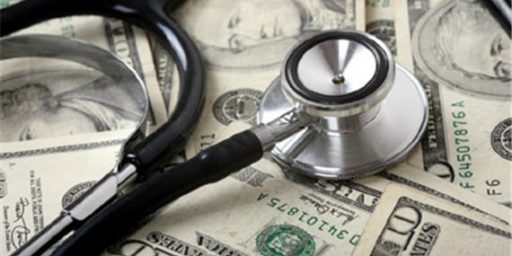Economic Insecurity
Kevin Drum, building on some points made by Mark Schmitt and others, has an interesting essay arguing that the U.S. economy has radically changed over the last thirty years or so into one where there is very little security.
It’s true that the rise in income inequality over the past 30 years has mostly been due to huge gains at the top end, not to declines at the bottom. The average worker may not be much better off than he was in 1973, but he’s not (generally speaking) worse off either.
So why does the economy feel so much worse to so many people? Hacker believes that one of the big reasons is that life has become so much more risky. People are a lot closer to the edge, closer to a single catastrophe that can wipe them out, than they were three decades ago.
This has a chilling effect even if nothing ever happens to you. Almost everyone who’s not already well off these days knows someone who’s been ruined by a personal catastrophe, and this personal knowledge rubs off. You’re worried that you could get laid off at any time — and not be able to find a job for months or years. You’re worred that a sudden healthcare crisis could devastate you. You’re worried that your pension fund or your 401(k) might not be there when you retire because you made bad investment choices.
There’s little doubt that this is true in one sense. Even though, standing on his shoulders, I’ve got much more education and training than my dad ever did, I’ve had much more career turmoil than he ever did. Partially, that’s a result of choices I’ve made, but it’s also due in significant part to a changed economy. It used to be common to start working for a company right out of school, spend 30-odd years working there, and then retire with a gold watch and a company pension. Far fewer people do that today and it’s a hell of a lot more stressful.
On the other hand, the average worker is far better off economically than he was in 1973. People live in much bigger houses, drive nicer cars, wear more expensive clothes, go out for dinner, have more gadgets, and so forth than previous generation counterparts. In 1973, having a 1300 square foot house, a 27-inch color television, and one car for the family was the pinacle of the average working man’s dreams. Now, aside from people living in major urban centers, people live in 2000-3000 square foot homes, have multiple televisions with TiVo and cable or satellite feed, several computers with broadband Internet access, and a pretty nice car for every driving age person in the family. Going out to restaurants or taking airplane flights have gone from special events to routine. Certainly, part of this is a phenomenon of two income families, which creates its own stressors, but even most single people manage to live a similar lifestyle. Indeed, a big part of the stress problem comes from the fact that people now compare themselves to a much wealthier cohort. The guy with the new Accord is upset that his neighbor just got a new Lexus. The guy making $60,000 a year in Omaha hears about guys making $100,000 in Los Angeles and thinks he’s falling behind.
We live in a free agent society, which has pluses and minuses. For example, sports fans are unhappy that players make salaries that were unimaginable even a decade ago, let alone three. They complain that the players show no loyalty to the team, gladly running off to another town for more money. And, yet, the owners, players, networks, and others who make their living off sports have all gotten substantially more wealthy.
As a complete aside, a word on the statistic that started the debate:
According to the brilliant analysts at the Institute for Women’s Policy Research, sixty-six million workers, or 54% of the workforce, does not get a single paid sick day after a full year on the job.
Here’s a clue from the fine print: “Excludes federal workers (who have paid sick leave); military, agricultural, and private household workers; and the self-employed.” So, we leave off a huge chunk of the economy, almost all of which gets sick leave, for no apparent reason? Why?






I’m sorry I missed this “golden age” everyone talks about (I was there for part of it; I just don’t remember it that way). It was what – 20 years out of 10,000 or so? Here’s what I think of when I think of the relatively recent past: Flu epidemic of 1918, polio, the Depression, and other fun stuff. Before that, we had the golden age of losing half of your children as a given.
One reason people worked at one job for 30 years was that there were few options open for most. I’m on my second (unrelated) degree and my third career – by choice. “Death of a Salesman” wasn’t written about basking in the sunshine of the glory days.
A key point from the fine print: government has avoided the changes—and the efficiencies—that have become part of the larger economy over the last 30 years. Can this go on forever?
I speak from total ignorance on this matter, but if one were to study the private workforce (i.e. excluding “federal workers, military, agricultural, and private household workers, and the self-employed”) thirty years ago and measure how much paid sick leave they obtained after one year, how would that compare to today’s level as reported in the study?